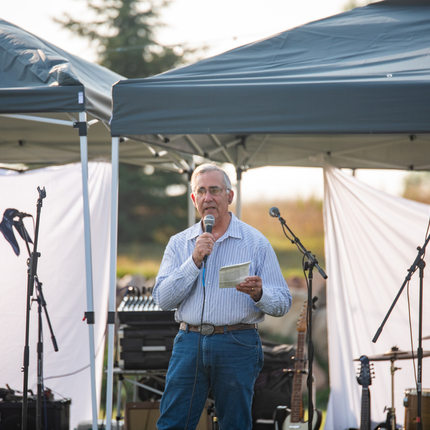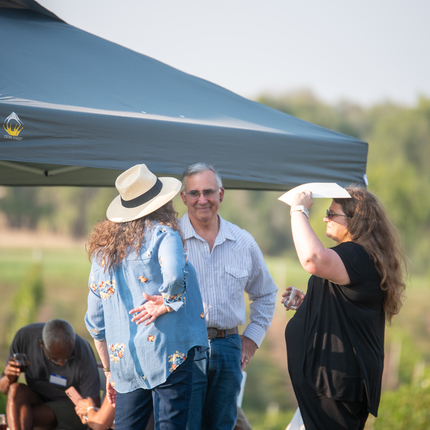Editor's note: Wyatt spoke at our 50th celebration event on Friday, Sept. 8, near Hartington, Nebraska. He has been a staff member for 30 years and counting, based out of our Hartington office.
I want to share some of my early impressions of the Center, and how some of those have evolved over the years.
I came to the Center in late 1992, just over 30 years ago, to work on a beginning farmer project. My predecessor left me with a weighty mission: we help people achieve their dreams. In particular, he told me of repeated comments from beginning farmers around the country looking for help who had somehow found the Center in those pre-Internet days. The refrain was: “You’re the only people who encouraged my dream of farming. No one else acknowledges this as a viable career. Not my teachers, not my high school guidance counselor, not even my parents.” Since then, I’ve heard that same response countless times to my phone and email conversations. But it’s not just cheerleading. We provide facts, and training, and access to mentors and resources–as well as warnings about how hard it can be. These are the invaluable tools new farmers need to succeed.
I have seen how we also do this in our small business program, as Tim Nissen described earlier: We provide encouragement, training, and financing to build businesses–so people can support themselves and their family, create jobs, become engaged in their communities in some of the most important ways. Thousands of people in Nebraska have made progress toward their goals with our help.
When I first started, I was impressed by how the Center creates experts among its staff. We ask staff to learn how to help people and they immerse themselves in an issue. Perhaps it’s our uniquely broad approach, but staff from unrelated backgrounds become national experts on their topic. I recall that a former nurse had become THE national go-to person on the Conservation Reserve program–not just how to apply, but the details of its funding and structure, how it worked and how it could be improved, who to lean on to get more support in Congress and USDA. I have seen this process repeated over and over.
Related to that is the Center’s penchant for instilling–some might say brainwashing–young staff people to apply our values to social issues. After a while, sometimes a very short while, young people almost inevitably move on to other jobs and adventures. The industrial world calls this ‘turnover,’ but for us it’s an opportunity. We send them out from here with this idealistic yet practical way of approaching the world’s problems. Some then work in other organizations or government agencies, influencing their approach and priorities. Some go on to lead other organizations or even create new ones, often becoming partners to expand our reach. Some start businesses and build their communities. Some even go on to farm and ranch [DENNIS DEMMEL! (Center board president)]–and demonstrate what they had been teaching others. People don’t work here and leave without taking some part of the Center with them.
I’ve also seen how we lead on rural and national issues. Such as center-pivot irrigation and its impacts on water supply, water quality, and erosion. Such as industrialization of the hog industry and impacts to farm income, communities, and the environment. Such as climate change. Such as the loss of beginning farmers. Such as bank consolidation. Such as rural employment and small businesses. Such as renewable energy. Such as rural health care. Those who disagree with our message say we’re baselessly prophesying or just wishing. But we do our homework, as one commenter said years ago. We don’t foretell the future so much as we take what rural people tell us of their experiences. And we find the data and evidence to tell their stories in ways that are not just vivid and solid, but that provide strategies and solutions.
As we move into our next 50 years, I’ve no doubt that we’ll see new challenges and opportunities–and will continue to be guided by the experiences of rural people, who can tell us what’s needed and how to continue to build a better world.
Feature photos: Top: Wyatt speaking at the 50th celebration. Bottom: Wyatt chatting with Barbara Dilley, member of the Center Board, and Sandra Renner, Farm and Community director. | Photos by Kylie Kai





